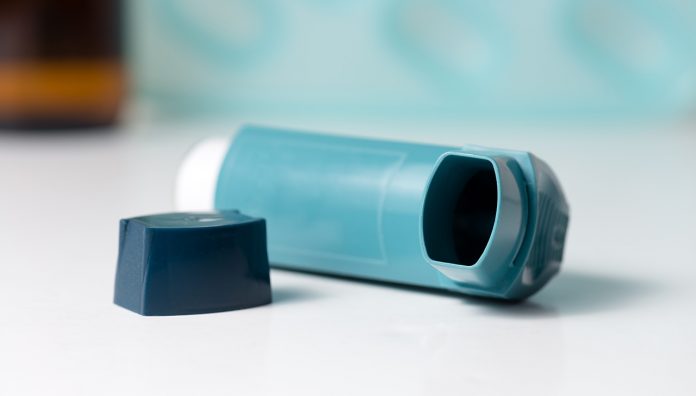Amendments to the Schedule 3 (S3) listing for salbutamol released last week will ease dispensing restrictions, hopefully reducing patient frustration and stopping abuse of some pharmacists.
The Therapeutic Goods Administration (TGA) made the amendments to the S3 entry for salbutamol that took effect in March, which aimed to limit excessive demand and stockpiling in the early days of the COVID-19 pandemic in Australia.
Seeking to ease and clarify these dispensing restrictions, the amendments include1:
- allowing pharmacists to dispense salbutamol inhalers to persons presenting with bronchospasm associated with asthma or chronic obstructive pulmonary disease, exercise-induced asthma and other stimuli known to induce bronchospasm
- a clarification that previous supply can be from any pharmacy
- keeping the one pack limit, which now applies to one ‘per person being treated’ rather than ‘per person’.
Salbutamol can still be supplied by pharmacists for use in institutional first aid or to persons authorised under state or territory law to possess it or supply it under lawful practice of their profession, without the limit of one pack per person.1
Where the conditions of the Schedule 3 entry are not met, the Schedule 4 salbutamol listing applies.
The TGA acknowledged that the earlier restrictions may have unintentionally affected people with a legitimate need to access salbutamol inhalers without a prescription. However, it reaffirmed the need to manage supply as shortages would result in significant adverse health outcomes for those with chronic diseases.1
Community pharmacist experiences
Researcher, lecturer and community pharmacist Dr Stephen Hughes has not experienced abuse himself, but canvassed feedback from some fellow community pharmacists in Sydney and surrounds.

He told Australian Pharmacist of the instances of abuse and stress experienced by his colleagues while trying to abide by new regulations.
One colleague with 30 years’ experience tried to explain to a woman who was not known to her that she was required to show proof of asthma before a salbutamol inhaler could be provided.
‘She screamed at me and told me I was putting lives at risk after she said she didn’t have a script for a preventer or salbutamol and she didn’t have an asthma action plan,’ the colleague said.
After the pharmacist suggested she contact her GP to fax or email a script, the patient kept up the abuse, telling the pharmacist that ‘doctors don’t have time to deal with such insignificant issues,’ and that she ‘shouldn’t be a health professional’.
‘I found it very challenging and don’t know how I could have dealt with it differently,’ the pharmacist said.
‘We were under extreme pressure at the time as we were a COVID hot spot and we were incredibly busy.’
A second colleague reported losing regular customers because he was unable to supply an inhaler for their relatives, adding: ‘I think the regulations and public perception are so at odds with each other that ill will and poor outcomes are inevitable.’
Two other respondents reported no problems, aside from supply issues and the need to constantly explain the changes to patients.
Dr Hughes’ approach is to avoid confrontation while seeking to understand the patient’s needs. He rarely uses the term ‘asthma’, but rather focuses on the symptoms and the impact of the environment.
‘I try to listen more than I talk and not steer the conversation,’ he said.
‘It doesn’t always work, but the aim is to hopefully set up longer term therapeutic relationships built on trust and honesty.’
Does the supply of salbutamol need to be recorded?
The need to record the supply of salbutamol is not affected by the scheduling changes and remains current, per each state and territory legislation.
The form of the record does not appear to be detailed specifically in each jurisdiction’s advice for pharmacists on the sale of S3 salbutamol, but ‘pharmacists must have prepared or adopted a quality standard and comply with the quality standard’, according to Queensland Health.
Pharmacists can refer to the quality standard outlined in PSA’s guidance document for supply of short-acting beta2-agonists (SABAs).
Expert opinion
Asthma educator Debbie Rigby FPS told AP that ‘only very few adolescents and adults should be relying on short-acting beta2–agonists to manage their asthma’.

‘Patients presenting to the pharmacy with symptoms shouldn’t be denied a salbutamol inhaler, but pharmacists should use the opportunity to ascertain how often they are getting respiratory distress and if symptoms affect their daily activities,’ she said.
‘If the response is more than twice a month, they should be referred to their GP for an asthma check. The majority should be prescribed a low-dose inhaled corticosteroid for ongoing management.’
‘The fundamental change in updated Australian asthma guidelines is to recommend the budesonide/formoterol inhaler as needed to manage current symptoms as well as the underlying inflammatory condition,’ Ms Rigby added.
Evidence shows that use of three or more SABA inhalers a year increases the risk of presentations to an emergency department, while the use of 12 or more SABA inhalers a year increases the risk of death.2
’The role of the pharmacist in providing education is vital,’ Ms Rigby said.
Find the PSA’s Guidance for provision of a Pharmacist Only medicine: Short-acting beta2-agonists (salbutamol and terbutaline) here.
References
- Australian Government Department of Health; Therapeutic Goods Administration. Notification of amendments to the Poisons Standard in relation to New Chemical Entities (NCEs) and Salbutamol. 2020. At: www.tga.gov.au/scheduling-decision-final/notification-amendments-poisons-standard-relation-new-chemical-entities-nces-and-salbutamol
- Rigby D. Anti-inflammatory reliever for mild asthma. Australian Pharmacist. November 2019:53–58.



 Dr Peter Tenni[/caption]
Dr Peter Tenni[/caption]
 How should we deprescribe gabapentinoids, according to the Maudsley Deprescribing Guidelines[/caption]
How should we deprescribe gabapentinoids, according to the Maudsley Deprescribing Guidelines[/caption]



 Pharmacists have always prescribed, but they have the potential to prescribe much more
Pharmacists have always prescribed, but they have the potential to prescribe much more







